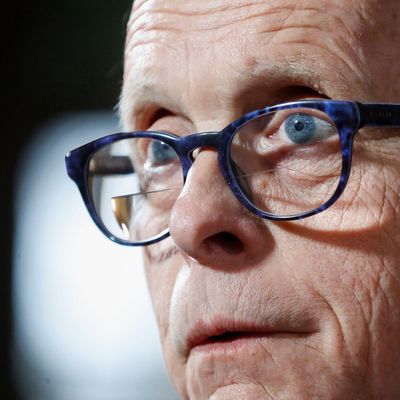
It has already become a bit of a cliché to say that the U.S. response to the coronavirus pandemic is a demonstration of our country’s system of federalism. That’s a positive for progressive observers pleased that governors like Andrew Cuomo, Jay Inslee, and Gretchen Whitmer are offering an alternative approach to the Trump administration’s erratic and sometimes deadly management of the crisis. But even federalism enthusiasts acknowledge that our relatively decentralized system makes coordination of emergency measures across state lines difficult — particularly with a Republican administration inclined to defer to corporations and Trump-friendly states in designing and administering its response. And the system can expose health-care workers, our first line of defense against the pandemic, to inadequate resources and (in some cases) poor state and local leadership.
The problems associated with federalism in an emergency are already becoming more evident as the Trump administration refuses to exert national leadership, as Richard Kreitner observes:
Instead of prematurely celebrating the leadership shown by states and cities as some kind of triumph of the American system, we ought to recognize it as a desperate grasping for the usual exceptionalist narrative at a time of systemic, world-historical national failure. Juliette Kayyem, a Homeland Security official under Obama, wrote in The Atlantic that Trump’s abandonment of the states calls to mind the weaker union of the Articles of Confederation, under which states constantly put up trade barriers with one another. States are already vying over precious resources—competition that raises the costs for everyone. It’s not inconceivable, once the virus spreads widely through Red State America—where denialist political and media figures have been consistently downplaying the seriousness of the pandemic—that armed checkpoints will go up on roads between states. It is almost as if the union is effectively dissolving before our eyes into its 50 component parts.
The checkpoints are already going up in Florida and Texas.
Many states left to their own devices are proving to be equally incapable of dealing with the task of holding fair and accessible elections during a pandemic. Yet congressional Republicans touting federalist principles blocked making the disinfection of polling places or vote-by-mail provisions a condition of the paltry sums of federal election assistance approved in the recent $2.2 trillion coronavirus stimulus bill. So we could wind up with even worse inequities in access to the ballot than we already experience in the typical national election, compounding the intrinsic inequality embedded in the archaic Electoral College system for choosing a president to serve alongside the wildly unrepresentative U.S. Senate.
Beyond the circumstances where state inequities are allowed to dictate national policies, the inability of states to overcome their constitutional and statutory limitations on spending and borrowing threatens to thwart the national response, as a Brookings Institution report has warned:
States have less room than the federal government to increase spending in response to downturns. Most states have balanced budget requirements, meaning that declines in tax revenues, if not offset by increases in federal funding, must be met by spending cuts or tax and fee increases …
[R]ecent developments have increased the short-term pressure on state budgets. Investor worries about the effects of the pandemic have spilled over into the market for municipal bonds, making debt more costly for states and localities—when they can borrow at all—and pushing the Federal Reserve to step in with support. In addition, the Treasury’s recent decision to delay the tax deadline until July 15, while beneficial for taxpayers, may create a cash shortfall for states that follow the Treasury’s deadlines and were expecting to receive large tax payments on April 15.
Furthermore, with most state fiscal years ending June 30, and with most states required to enact budgets that they expect to balance, it is likely that state and local governments will start paring back spending relatively soon.
Such cutbacks — likely resulting in highly counterproductive budget cuts and public employee pay cuts, furloughs, and layoffs — may be arriving soon. Ohio governor Mike DeWine has frozen both state-government hiring and new service contracts, and is looking for ways to cut the state’s budget by as much as 20 percent. Per the Hill, other states will follow:
State and local experts say the coming months will be a bloodbath for governments that are required by law to maintain balanced budgets. They will be forced to choose between steep and painful cuts to social programs that are already underfunded or tax hikes at a time when millions of people will be unemployed.
As will local governments:
A survey of local government officials by the National League of Cities found half expected to have to draw down financial reserves within the next six months. A quarter predicted they would have to cut services, and a quarter thought they would have to lay off staff.
At a time when the federal government is struggling — to use the latest buzzword for quick infusions of liquidity in the economy — to “toss money out of helicopters,” it’s beyond absurd that the agencies tasked with handling this public-health crisis may adopt austerity policies, laying off workers and cutting program funding. Yes, the coronavirus stimulus legislation included $150 billion for state and local governments, wrested unwillingly from Senate Republicans focused on corporate and individual assistance. But it’s likely to represent no more than a drop in a leaky bucket if the economic dislocations we all expect assume their full proportions.
We obviously cannot change our basic constitutional system overnight, even normally, much less in the middle of a national crisis. But past reforms of the federalist system designed to promote equity and ensure that urgent public tasks don’t fall prey to the incapacity or malice of policy-makers have often followed national emergencies, from the Civil War to the Great Depression to the civil-rights revolution. At a minimum, it would be helpful right now if conservative politicians would stop using state and local autonomy as an excuse to frustrate national efforts to manage the pandemic, restore the economy, and ensure we have a functioning democracy before and after the November elections. In an all-hands-on-deck situation with huge life-or-death consequences, burning incense on the altar of federalism is a feeble excuse for leadership.






























